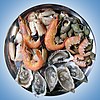Epis
 Epis | |
| Alternative names | Epise, zepis |
|---|---|
| Type | Flavor base |
| Place of origin | Haiti |
| Main ingredients | Bell peppers, garlic, citrus juice, parsley, and other herbs and spices |
Epis (/ˈɛpiːs/, Haitian Creole: epis) is a blend of peppers, garlic, and herbs that is used as a flavor base for many foods in Haitian cuisine.[1] Some refer to it as a pesto sauce.[1] It is also known as epise and zepis.[2] It is essential for Haitian cuisine.[3]
Background
Epis has Taino and African origins.[1] It also has similarities to sofrito which is used in Hispanic cuisine.[1][2] This use of a flavor base is common in Caribbean cuisine.[1]
Ingredients
Epis often contains parsley, scallions, garlic, citrus juice, and Scotch bonnet peppers.[4] Numerous recipes for epis exist, as traditionally, Haitian women would cook and have their personal epis recipe.[4] Also, various regions have different recipes.[1]
Preparation
Traditionally, epis is made with a large wooden mortar and pestle (called munsh pilon).[1][2][4] Today, it is often made with a blender.[1][4] The ingredients are blended until the consistency is as smooth as desired.[5][6]
Use
It can be used as a marinade for meat.[4][7][8] It can also marinate fish.[1] It also is added to flavor a number of Haitian dishes.[8] This includes rice and beans, soups, and stews.[1] It is a convenient way to utilize flavors from fresh herbs and spices in everyday cooking.[7] Many Haitians have epis available on hand to be used for various dishes.[6]
Dishes
Storage
Epis can last up to three months in the refrigerator, but this time will vary depending on the ingredients that are used.[5] The acidity helps keep the ingredients from spoiling.[5] Epis will last indefinitely in the freezer and will not transfer its odor to other freezer items.[7] The epis can be distributed in an ice cube tray and frozen, so that the frozen cubes can be used in future cooking.[9]
See also
References
- ^ a b c d e f g h i j "Haitian Epis". Haitian Cooking -. 2020-08-26. Retrieved 2021-04-11.
- ^ a b c "Haitian epis". That Girl Cooks Healthy. Retrieved 2021-04-11.
- ^ Louis-Jean, James; Sanon, Debbie; Louis-Jean, Kevin; Sanon, Nicole; Stvil Louis-Jean, Ruthonce; Thomas, Michelle Luvy (2021-04-09). "Valorization of pikliz: a spicy meal garnishment in Haitian cuisine". Journal of Ethnic Foods. 8 (1). Springer Science and Business Media LLC. doi:10.1186/s42779-021-00077-5. ISSN 2352-6181.
- ^ a b c d e Long, L.M. (2015). Ethnic American Food Today: A Cultural Encyclopedia. Ethnic American Food Today. Rowman & Littlefield Publishers. p. 257. ISBN 978-1-4422-2731-6. Retrieved 2021-04-11.
- ^ a b c "Haitian Epis (Haitian Seasoning Base) Recipe". Savory Thoughts. 2019-01-07. Retrieved 2021-04-11.
- ^ a b "Epis (Haitian Seasoning Base)". Epicurious. 2016-12-19. Retrieved 2021-04-11.
- ^ a b c Ménager, M.C. (2005). Fine Haitian Cuisine (in French). Educa Vision. p. 53. ISBN 978-1-58432-256-6. Retrieved 2021-04-11.
- ^ a b Charles, T.; Alcántara, J. (2021). Freedom Soup. Candlewick Press. p. 31. ISBN 978-1-5362-2165-7. Retrieved 2021-04-11.
- ^ "Simple Haitian Epis". sidechef.com. 2021-01-18. Retrieved 2021-04-11.

